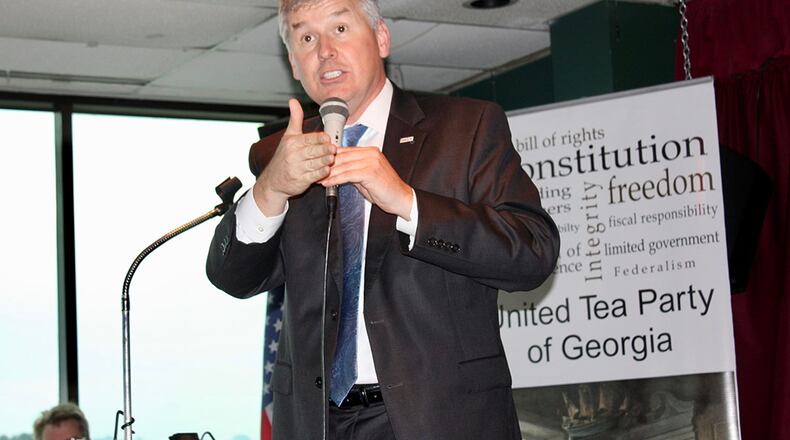It was billed as a chance for beleaguered Gwinnett County Democrats to “cry in your beers or laugh out loud.” But at a recent gathering of partisans, Gabe Okoye recounted with glee, it was more celebrating than moaning.
Training seminars organized by the Gwinnett Democratic Party for first-time office seekers fill up in hours. Events are packed with new members. And Okoye, the party’s chairman, no longer has to spend months begging candidates to run for Congress; this year he expects a bumper crop.
“We will probably end up with seven to nine candidates. All these people aren’t fools. They see the handwriting on the walls. So we must be doing something right,” Okoye said. “This time they actually believe.”
Jon Ossoff's near miss in Georgia's 6th Congressional District has Democrats optimistic they can compete for another conservative stronghold right next door: a Gwinnett-based district represented by a low-profile Republican who has coasted to easy victories since taking office in 2011.
The growing gaggle of Democrats challenging U.S. Rep. Rob Woodall point to the factors that buoyed Ossoff’s campaign: outrage over President Donald Trump and the perennial promise of fast-changing demographics finally coming true in Gwinnett.
What they don't often mention is that the same elements that hobbled Ossoff in Atlanta's northern suburbs could cripple Democrats just to the east. Republicans still hold the demographic advantage in the 7th District overall and, as Ossoff's 4-point loss showed, Democrats are still searching for a formula for victory in GOP bastions.
"The Jon Ossoff model, to be fair, is to have absolutely no record at all and to find somebody willing to pay $30 million to help you," Woodall said. "That is absolutely a powerful model. That is not what we're going to have in the 7th District of Georgia."
‘Of course there’s Trump’
Shaped a bit like a backward Pac-Man, the district gobbles up much of Gwinnett from Snellville and Lilburn to the south through I-85 to the banks of Lake Lanier. It darts west to ensnare the southern half of less-populous — and deeply conservative — Forsyth County.
It has similarities to its more famous 6th District cousin to the east: A conservative flank. A highly educated population. And a level of GOP trepidation over Trump. The president captured the 7th District with 51 percent of the vote. Four years earlier, Mitt Romney carried it by 22 points.
Democrats have gradually made gains in the Gwinnett portion of the district, and Hillary Clinton flipped the county in November for the first time in decades. Gwinnett's new status as a majority-minority county has further stoked the party's hopes, and the Democratic Congressional Campaign Committee recently listed it as a top target in 2018.
Steve Reilly welcomes the attention. He ran for the seat in 2012 and got clobbered by Woodall, capturing just shy of 38 percent of the vote. He’s running again, confident that the surge of candidates in the race signals that other Democrats see the same opportunity he does.
“There’s the attention that the 6th District got. There’s the rapidly changing demographics,” he said. “And of course there’s Trump.”
Relying on that formula alone, as Democrats know, likely won’t be enough.
For one, the unprecedented media blitz and fundraising hauls in the June runoff next-door was a one-time deal. Democrats have long talked of a growing coalition of minorities and newcomers powering them to a comeback; Republicans have only consolidated their gains in statewide offices.
And while the advent of Trump has energized Democrats, it has also left them with a Goldilocks syndrome: Candidates in Republican-leaning districts struggle to find the “just right” way to assail Trump while not alienating the independents they need.
Still, Reilly sees a tantalizing path to victory: Run up the score in the part of the district that cuts through Gwinnett. And cut the GOP margins in south Forsyth, the reddest part of the territory.
“We’ve got to make a dent in south Forsyth to pull it off,” said Reilly, an attorney who is also the party’s 7th District chairman. “That’s the linchpin for Woodall to hold onto the seat. There’s some demographic shifts there, too, with newcomers with different perspectives.”
Republicans are already working to shore up the district. Justin Hawkins, a 25-year-old with a passion for organizing, is in charge of the fortifications in Forsyth.
He rattled off a string of preparations to fend off Democrats: An improved fundraising plan. A task force to reach out to the growing Indian population, now about one-sixth of the community. Programs to mobilize younger voters. And an August fundraiser featuring U.S. Rep. Trey Gowdy, the South Carolinian with a national profile.
“We knew this was coming, and we are ready for it,” said Hawkins, the county’s lead GOP operative. “We saw what happened in the 6th and we knew they were coming.”
A vanishing ‘path’
Joel McElhannon, a veteran GOP strategist, said Woodall “should be fine” so long as he runs a strong campaign and avoids damaging miscues. Yet he cautioned against drawing sweeping conclusions about GOP strength in the suburbs from Karen Handel’s win in the 6th District race.
“To win the 7th, or the majority in the House for that matter, Democrats need to find a path to appeal to moderate Republicans,” he said, “or they need to hope the GOP nominates very flawed candidates.”
The handful of contenders in the running are already highlighting their roots in the territory, aiming to strike a contrast with Woodall, an Athens native who worked as a congressional aide for much of his career. He was the chief of staff for U.S. Rep. John Linder when he emerged from an eight-man primary to replace his retiring boss.
A policy wonk known for his occasional oddball posters, Woodall's reliably conservative voting record will be deployed against him by Democrats. An analysis by FiveThirtyEight found that he's voted 100 percent in line with Trump's positions this year.
Kathleen Allen, a prominent local homeless advocate and nonprofit executive, entered the race in April with a pledge to listen to all views. And David Kim, the Harvard-trained founder of a national test prep company, joined the contest in June — and tapped veteran consultant Joe Trippi to help sharpen his campaign.
“I think there is a strong desire for someone who is less partisan, for someone who’s had a voting record that’s been less of a rubber stamp along party line,” said Kim, the son of Korean immigrants.
Joining the race Wednesday was another Democrat, Carolyn Bourdeaux. The Georgia State University policy professor said lawmakers should fully implement Obamacare, and Georgia should fully expand Medicaid, before exploring other solutions that would expand access to health care. But she added there is “more than one way to skin a cat.”
Okoye said a half-dozen or so other candidates are rumbling about a run, and he can’t help but marvel at the interest.
“Believe me, I love having this headache,” Okoye said. “I used to get the runaround. Now the phone doesn’t stop ringing.”
GEORGIA POLITICS
The 6th Congressional District special election in the north Atlanta suburbs was probably the nation's most-watched campaign this year. Now, Democrats in the neighboring 7th District see opportunities to win there. Follow our coverage at http://www.myAJC.com/politics.
About the Author
Keep Reading
The Latest
Featured




